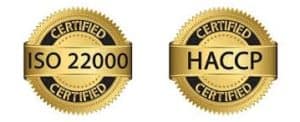
Having valid credentials to back your business is an important part of success. Standards have been created for varying types of businesses to universally cite them as applying certain system management, pre-requisite programs, and having the necessary certifications to run that specific business safely and effectively. ISO standards were created to identify specifications, requirements, and guidelines for business to follow. Becoming ISO certified can be a difficult task to implement, but with help from a third part company it can be a smooth transition and prove to be especially beneficial for future business. HACCP certifications serve a main focus of the sanitation of facilities, products, and equipment; whereas certifications provide companies with quality control. There are typically utilized in the food industry.
While there are many types of ISO certifications, a popular ISO is ISO 22000. This specific ISO has to do with food safety management systems. The system puts in place international standards that require food chain safety regulations all the way from “farm to fork”. The standard includes system management, pre-requisite programs and HACCP plans, updating of the food safety management systems, and interactive communication. ISO 22000 is suitable for every business that is relevant to the food chain. Even companies that can seem trivial to the food industry like packaging, cleaning products, or utensil producers are able to get certified in ISO 22000. For a company with no standards already set in place that overlaps with ISO 22000, it can be a large company cultural change. However, companies like Aegis make it easy. This standard is beneficial because it’s an international standard, meaning you won’t run into problems when working with global consumers or clients. It also covers the majority of current retailer food safety standards.
ISO 22000 complies with HACCP principles, another type of certification available to companies. HACCP stands for Hazard Analysis Critical Control Points. This certification serves as the platform for international legislation and standard manufacturing methods for each section of the food chain. HACCP is relevant for all international trade when it comes to food product, so if you deal globally, this certification is recognized across the globe. It acts as a risk management tool, and allows you to focus in on potential hazards. HACCP certification gives your company established control limits that come about during the production procedure, as well as complies with national and international food safety requirements. Having an HACCP certification displays your commitment to food safety to your consumers.
The 7 points of HACCP are:
- Conduct a hazard analysis
- Identify critical control points
- Establish critical limits
- Establish monitoring procedures
- Establish corrective actions
- Establish verification procedures
- Record keeping procedure
Both certifications may sounds complicated to merge into an already existing company culture and established technique, but the benefits of certification outweigh the cons. With the help of companies like ours in Qatar, certification is simple. At AEGIS Services, we offer industry experts, competitive prices, guaranteed results, quick turnaround, and post-certification services to make getting an ISO certification a no brainer. Call us at +974-4466-2120 or email us at email to learn more.



